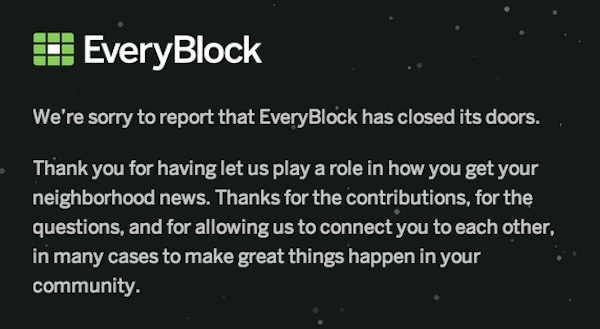

I was saddened today to learn that NBC News is shutting down Everyblock, the Knight-funded local project created by Adrian Holovaty, Wilson Miner, Dan O’Neil and Paul Smith. It was an exciting attempt to help organize information and data for cities and neighborhoods — and it was inspiring to watch them attempt something both local and scalable, in a way that many people (aside from maybe Patch) have abandoned.
I’ve lived in some amazing neighborhoods over the past five years, but I can’t say I ever knew them like a local should. We’ve had kids and moved from Brooklyn to Manhattan and now to Oakland.
Now, after seven months on the West Coast, it occurs to me that I know my neighborhood more deeply than I ever did in New York.
It’s not because New York is crowded and anonymous. It’s because preschool has started.
There is suddenly a geographic social scene in which we are automatically included. And it made me realize that when we talk about local, many of us are really talking about kids.
Our social media lives are global, but in our pre-kid lives, the geographic social scene revolved around bars and restaurants and concerts and sporting events. But we were never tied to our neighborhoods. We could go out in Cobble Hill, but we could just as easily go out in the West Village. Our friends were dispersed everywhere around the city. It was relatively easy for everyone to travel to each other.
School changes the boundaries dramatically. Where you decide to live can be decided by the reputation of the school district. And suddenly, you must care about what’s in your immediate vicinity.
For many, the best scenario is to live within blocks of the schools that your children will attend. Being close to school makes everything easier—for friendships, playdates, sporting events, fundraisers, carpooling, and when they’re old enough, walking to school. My parents were newcomers to Fresno when I was born, and they told me what every parent tells me: We met all of our friends through our kids’ schools.1
In the 1980s, my dad also met people through a local club called the Junior Chamber of Commerce, or Jaycees. For him, there were business reasons for getting to know people in his community. He was an insurance agent, so his network of potential clients came from local businesses and the relationships he developed in his neighborhood.
Think of your friends. Are many of them still working for a truly “local” or locally dependent business? Or do they commute by car or train from their suburb to a larger city? Or do they simply work on the Internet?
The truly local business is an endangered species, which means there are fewer advertisers for small local newspapers, and fewer people who are interested in their cities for “business” reasons. I’m not necessarily worried about how things are changing so rapidly, but it could help explain why none of my friends are members of the Jaycees, or Rotary Club, or Kiwanis. Local clubs are aging, and there are fewer young people coming in to replace them. Their social lives are elsewhere. They are connecting globally for global work.
This is all to say: I think the app or company that “solves” local will probably be a parenting app. Not necessarily a “local” app.
I’m certainly not suggesting that only parents care about their communities—that’s not the case at all, and every city will have a diverse makeup of people who make their community special.
But what I am suggesting is that parenting is something that can force a passive resident (like myself) to suddenly pay closer attention to what’s going on around me. It’s what made me realize there is a lot of local information missing from my media diet. And I want a remedy.
When we moved to Oakland, we asked people: How do we find out what’s going on? They suggested blogs like Susan Mernit’s Oakland Local, but they also recommended a number of different Yahoo Groups and Google Groups, mostly for parents. These private forums (and parents want them private) are still the backbone of local conversation across the United States, and no one has introduced a better approach yet.
I’m seeing more possibilities everywhere I look: Jeff Atwood’s Discourse.org, announced this week, seems perfect for local. So could something like GroupMe or Couple or Avocado.
It’s nice to see that Patch is still here, but it’s also slightly depressing to think they’re the only ones trying. If you’re working on something local, I’d love to hear about it.
But I wouldn’t be surprised if, one day, we all discover a great new parenting app that sneaks up on us and then reveals that it’s really for everyone in the neighborhood.
Mark Armstrong is the founder of Longreads and editorial director of Pocket. This piece originally ran on his Tumblr.